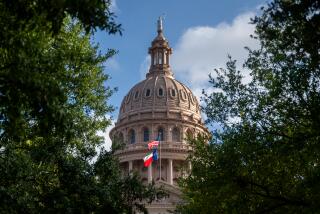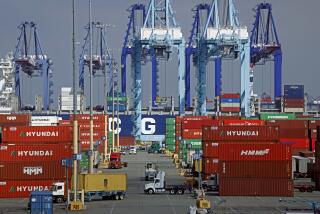The Oil Boom’s Over, but Texas Still Isn’t a Bust
DALLAS — One of the problems when an all-out boom ends and an economy turns sour is that even a return to normal growth pales beside some of the expectations built up earlier.
Such is the case in Texas these days. There is not much prospect that the oil industry will return to the wild days of 1981, when it wasn’t even seen as a gamble to bet on higher oil prices. With prices now about half what they were in ‘81, the standard view is that the Texas economy faces a long pull out of its severe setback. Indeed, in Dallas, where diversification was supposed to ease the effect of what’s happened in the oil business, there is an awesome 24% downtown vacancy rate in commercial buildings. Real estate prices have declined and the unemployment rate for the state is still more than 9%, well above the national rate.
With those numbers to think about, investors aren’t exactly flocking to Texas these days. “I think essentially we’ve been red-lined” by the investment community, says Edward L. McClelland, vice president and economist for RepublicBank Corp. in Dallas.
Yet those numbers tell only part of the Texas story. The state already is showing some rebound from the oil debacle. Total employment in the state, which bottomed out last summer at more than 4% below the peak in 1985, is now almost back to the previous high. Single-family home building remains fairly strong, and the state, for all the talk about people who migrated here from the troubled industrial Midwest heading back, is still enjoying in-migration.
It may not be like it was, but it is hardly a picture of total despair.
Part of the problem is that the Texas boom actually kept going for a while after the oil boom was over. Expectations, once kindled, are sometimes hard to snuff out. Hence, job creation in the Dallas-Fort Worth area, which totaled a little more than 60,000 in 1981, the peak of the oil drilling activity, actually grew to 150,000 in 1984 before falling off to fewer than 35,000 new jobs last year.
Several things happened to produce that late reaction. People kept right on coming to Texas in record numbers for another year after the oil price decline began in 1981. Residential construction matched that trend by staying at a peak for another year beyond that, and commercial building activity had so much momentum that it didn’t turn down until well into 1984.
What was happening, McClelland believes, is that the rest of the national economy was so weak, particularly the manufacturing areas of the Midwest, that Texas continued to look good even after the oil picture changed.
Now, the question is how long will it take for Texas to begin to look good again. And the answer is sooner than oil alone would make likely. A number of factors will bring this about, not the least of which is the huge overhang of commercial property. The opportunity to get low rents will be an attraction to those firms contemplating a move here. So will lower wage scales and housing costs.
Other states, like California, and regions, like New England, are growing, too, but they lack the favorable costs. When American Airlines moved its headquarters to the Dallas area from New York in 1979, its employees received, in effect, an average 18% pay increase from lower state and local income taxes alone. These are factors that business executives look at when they begin searching for new plant locations. Texas has a strong high-tech and defense industry, and when local living costs are low, it is a lot easier to recruit engineers and other skilled staff.
Just what will happen to the oil business in Texas is anybody’s guess. The moderate recovery in prices recently will probably lead to more oil field activity this year in the form of development wells--going after oil already discovered. But the boom in exploration won’t return with prices at this level.
What that means is that Texas will grow more moderately than before, and that is not all bad. “Everybody knows the damage that wild markets can do,” observes McClelland, whose bank was one of the few not caught up in the oil rush. “I hope Texas learned some lessons,” he adds. “Local economic conditions are determined beyond our borders--beyond national borders. Once we get it going again here, I hope it doesn’t snowball.”
More to Read
Inside the business of entertainment
The Wide Shot brings you news, analysis and insights on everything from streaming wars to production — and what it all means for the future.
You may occasionally receive promotional content from the Los Angeles Times.










